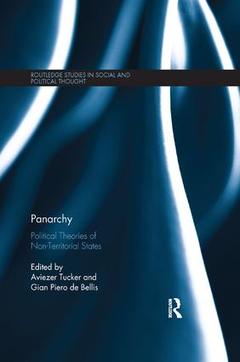Panarchy Political Theories of Non-Territorial States Routledge Studies in Social and Political Thought Series
Coordonnateurs : Tucker Aviezer, de Bellis Gian Piero

Panarchy is a normative political meta-theory that advocates non-territorial states founded on actual social contracts that are explicitly negotiated and signed between states and their prospective citizens. The explicit social contract, or a constitution, sets the terms under which a state may use coercion against its citizens and the conditions under which the contract may be annulled, revised, rescinded, or otherwise exited from. Panarchy does not advocate any particular model of the state or social justice, but intends to encourage political variety, innovation, experimentation, and choice. With its emphasis on explicit social contracts, Panarchy offers an interesting variation on traditional social contract theories.
Today, Panarchist political thought is particularly relevant and interesting in the context of globalization, increased international migration, the weakening of national sovereignty, the rise of the internet "cloud" as a non-territorial locus of political and protopolitical social networks that are not geographic, the invention of cryptocurrencies that may replace national currencies, and the rise of urban centers where people of many different political identities live and work together.
This is the first volume to bring together key philosophically and politically interesting yet often overlooked Panarchist texts. From the first published translation of de Puydt seminal 1860 article to contemporary Silicon Valley political theory, the volume includes Panarchist texts from different eras, cultures and geographical regions. The amassed wealth of theoretical insight enables readers to compare different texts in this tradition of political thought and distinguish different streams and varieties within this political tradition, in comparison with Cosmopolitanism, Contractarianism, and Anarchism.
Introduction Aviezer Tucker and Gian Piero de Bellis 2. Panarchy Paul Emile de Puydt 3. On the Production of Security Gustave de Molinari 4. Panarchy. A Forgotten Idea of 1860 Max Nettlau 5. The Manifesto of Peace and Freedom Kurt Zube 6. John (Jörn) Zube 7. Extraterritoriality: Its Rise and Its Decline Shih Shun Liu 8. Non-Territorial Governance - Mankind’s Forgotten Legacy Richard CB Johnsson 9. Federalism and Non-Territorial Minorities Dietmar Kneitschel 10. Choose Your Own nationality (2000) Yves Plasseraud 11. Systemantics. How systems works and especially how they fail, selections John Gall 12. A Foundation for Panarchy Michael Rozeff 12. Virtual Cantons Roderick T. Long 13. A Utopia? Government without Territorial Monopoly Bruno Frey 15. The Right to Walk Away Gene Callahan 16. The Best States Aviezer Tucker 17. Towards YouTopia: Must All Public Good Providers Remain Earthbound? Max Borders Conclusion
Aviezer Tucker is a political philosopher and theorists. He is an associate of the Davis Center at Harvard.
Gian Piero de Bellis manages the World Wide Wisdom Research and Documentation Centre in Saint-Imier (Swiss Jura) focused on Panarchy and related themes.
Date de parution : 11-2017
15.2x22.9 cm
Date de parution : 12-2015
15.2x22.9 cm
Thèmes de Panarchy :
Mots-clés :
Panarchy; Political Theory; Political Philosophy; Aviezer Tucker; Gian Piero de Bellis; History of the State; Post-Westphalia; Anarchism; Intellectual History; Hang Man; Vice Versa; De Puydt; REVUE TRIMESTRIELLE; Non-Territorial States; John Zube; Non-territorial Governance; Gian Piero; Non-territorial Federalism; Fine Day; Explicit Social Contracts; Hypothetical Social Contracts; Individualist Anarchist; Territorial Monopoly; Violated; Central Government; Paul Emile De Puydt; Free Nation; Hill Country Tamils; Non-territorial Minorities; NATO Secretary General; Private Advisory Service; West Germany; Personal Cultural Autonomy; Paul Schiemann



